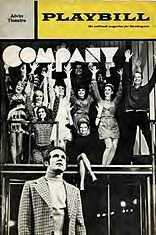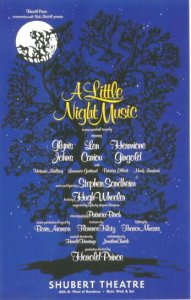
A Little Night Music is a musical with music and lyrics by Stephen Sondheim and book by Hugh Wheeler. Inspired by the Ingmar Bergman film Smiles of a Summer Night, it involves the romantic lives of several couples. Its title is a literal English translation of the German name for Mozart's Serenade No. 13 for strings in G major, Eine kleine Nachtmusik. The musical includes the popular song "Send In the Clowns".

Stephen Joshua Sondheim is an American composer and lyricist known for more than a half-century of contributions to musical theatre. Sondheim has received an Academy Award, eight Tony Awards, eight Grammy Awards, a Pulitzer Prize, a Laurence Olivier Award, and a 2015 Presidential Medal of Freedom. He has been described by Frank Rich of The New York Times as "now the greatest and perhaps best-known artist in the American musical theater". His best-known works as composer and lyricist include A Funny Thing Happened on the Way to the Forum (1962), Company (1970), Follies (1971), A Little Night Music (1973), Pacific Overtures (1976), Sweeney Todd (1979), Merrily We Roll Along (1981), Sunday in the Park with George (1984), Into the Woods (1987), Assassins (1990), and Passion (1994). He also wrote the lyrics for West Side Story (1957) and Gypsy (1959).
"Send In the Clowns" is a song written by Stephen Sondheim for the 1973 musical A Little Night Music, an adaptation of Ingmar Bergman's film Smiles of a Summer Night. It is a ballad from Act Two, in which the character Desirée reflects on the ironies and disappointments of her life. Among other things, she looks back on an affair years earlier with the lawyer Fredrik, who was deeply in love with her but whose marriage proposals she had rejected. Meeting him after so long, she realizes she is in love with him and finally ready to marry him, but now it is he who rejects her: he is in an unconsummated marriage with a much younger woman. Desirée proposes marriage to rescue him from this situation, but he declines, citing his dedication to his bride. Reacting to his rejection, Desirée sings this song. The song is later reprised as a coda after Fredrik's young wife runs away with his son, and Fredrik is finally free to accept Desirée's offer.
Lyrics are words that make up a song usually consisting of verses and choruses. The writer of lyrics is a lyricist. The words to an extended musical composition such as an opera are, however, usually known as a "libretto" and their writer, as a "librettist". The meaning of lyrics can either be explicit or implicit. Some lyrics are abstract, almost unintelligible, and, in such cases, their explication emphasizes form, articulation, meter, and symmetry of expression. Rappers can also create lyrics that are meant to be spoken rhythmically rather than sung.
A leitmotif or leitmotiv is a "short, constantly recurring musical phrase" associated with a particular person, place, or idea. It is closely related to the musical concepts of idée fixe or motto-theme. The spelling leitmotif is an anglicization of the German Leitmotiv, literally meaning "leading motif", or "guiding motif". A musical motif has been defined as a "short musical idea ... melodic, harmonic, or rhythmic, or all three", a salient recurring figure, musical fragment or succession of notes that has some special importance in or is characteristic of a composition: "the smallest structural unit possessing thematic identity."
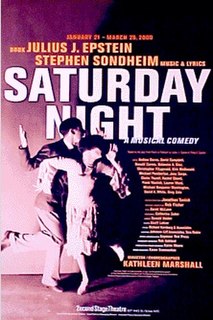
Saturday Night is a musical with music and lyrics by Stephen Sondheim, and the book by brothers Julius J. Epstein and Philip G. Epstein, based on their play, Front Porch in Flatbush. The musical was expected to open on Broadway in 1954-1955, but because of the lead producer's death, it was not produced. Following a student production, it was staged at the Bridewell Theatre, London in 1997 and then in Chicago in 1999 and Off-Broadway in 2000. The musical also ran in the West End in 2009.
"Die Moritat von Mackie Messer" is a song composed by Kurt Weill with lyrics by Bertolt Brecht for their music drama Die Dreigroschenoper, or, as it is known in English, The Threepenny Opera. It premiered in Berlin in 1928 at the Theater am Schiffbauerdamm. The song has become a popular standard recorded by many artists, including a US and UK number one hit for Bobby Darin in 1959.

Charles Hart is a British lyricist, songwriter and musician. He is best known for writing the lyrics to, and contributing to the book of, Andrew Lloyd Webber's stage musical The Phantom of the Opera and for writing the lyrics to Bend It Like Beckham the Musical. He also co-wrote the lyrics to Lloyd Webber's 1989 musical Aspects of Love. Hart also re-wrote Glenn Slater's lyrics for Love Never Dies, the sequel to Phantom.
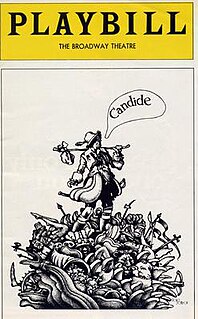
Candide is an operetta with music composed by Leonard Bernstein, based on the 1759 novella of the same name by Voltaire. The operetta was first performed in 1956 with a libretto by Lillian Hellman; but since 1974 it has been generally performed with a book by Hugh Wheeler which is more faithful to Voltaire's novel. The primary lyricist was the poet Richard Wilbur. Other contributors to the text were John Latouche, Dorothy Parker, Lillian Hellman, Stephen Sondheim, John Mauceri, John Wells, and Bernstein himself. Maurice Peress and Hershy Kay contributed orchestrations. Although unsuccessful at its premiere, Candide has now overcome the unenthusiastic reaction of early audiences and critics and achieved enormous popularity. It is very popular among major music schools as a student show because of the quality of its music and the opportunities it offers to student singers.

"What It's Like" is a song by American musician Everlast. It was released in September 1998 as the lead single from his album Whitey Ford Sings the Blues. The song is typical of the style Everlast embraced after leaving hip hop trio House of Pain, being a combination of rock, hip-hop and blues incorporating characterization and empathy towards impoverished protagonists.
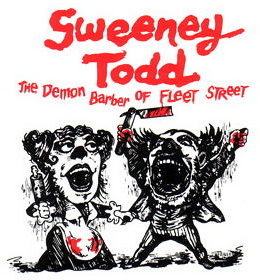
Sweeney Todd: The Demon Barber of Fleet Street is a 1979 musical thriller with music and lyrics by Stephen Sondheim and book by Hugh Wheeler. The musical is based on the 1973 play Sweeney Todd: The Demon Barber of Fleet Street by Christopher Bond.
"Summertime" is an aria composed in 1934 by George Gershwin for the 1935 opera Porgy and Bess. The lyrics are by DuBose Heyward, the author of the novel Porgy on which the opera was based, although the song is also co-credited to Ira Gershwin by ASCAP.
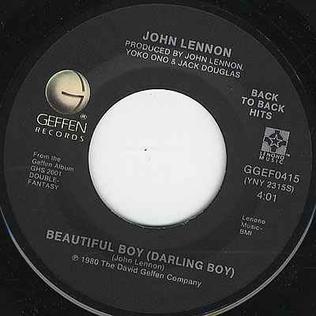
"Beautiful Boy " is a song written and performed by John Lennon. It was released on the 1980 album Double Fantasy, the last album by Lennon and Ono released before his death.
"I Feel Pretty" is a song from the 1957 musical West Side Story.
The 42nd Tony Awards ceremony was held on June 5, 1988, at the Minskoff Theatre and broadcast live on CBS, hosted by Angela Lansbury..
A concept musical is a work of musical theater whose book and score are structured around conveying a theme or message, rather than emphasizing a narrative plot.
"Being Alive" is a song from the musical Company by George Furth with music and lyrics by Stephen Sondheim. The song appears at the end of Act II and is sung by the main character, Robert, a 35-year-old bachelor who at the show's end “.. . realizes being a lone wolf isn't all it's cracked up to be. .. he declares that he wants to take the chance, be afraid, get his heart broken - or whatever happens when you decide to love and be loved."
"Advance Romance" is a Frank Zappa song originally from his live album with Captain Beefheart, Bongo Fury. Other versions of the song can be found on You Can't Do That on Stage Anymore, Vol. 3, You Can't Do That On Stage Anymore, Vol. 5, and Make a Jazz Noise Here. It is a humorous parody of typical love songs and is sung by Napoleon Murphy Brock with George Duke. "Advance Romance" was commonly played with the song "Carolina Hard-Core Ecstasy" in concert. The song was played from 1975 to 1976 and from 1980 to 1988 making the song one of Zappa's most performed. Almost all of Zappa's lineups after its release on Bongo Fury played this song in concert.
"A Little Green Rosetta", by Frank Zappa, is the final song on the 1979 concept album Joe's Garage Acts II & III. The main character from this triple-album rock opera is faced with the decline of the music industry, and is forced to work on an assembly line placing little frosted rosettes on top of muffins at the Utility Muffin Research Kitchen facility


